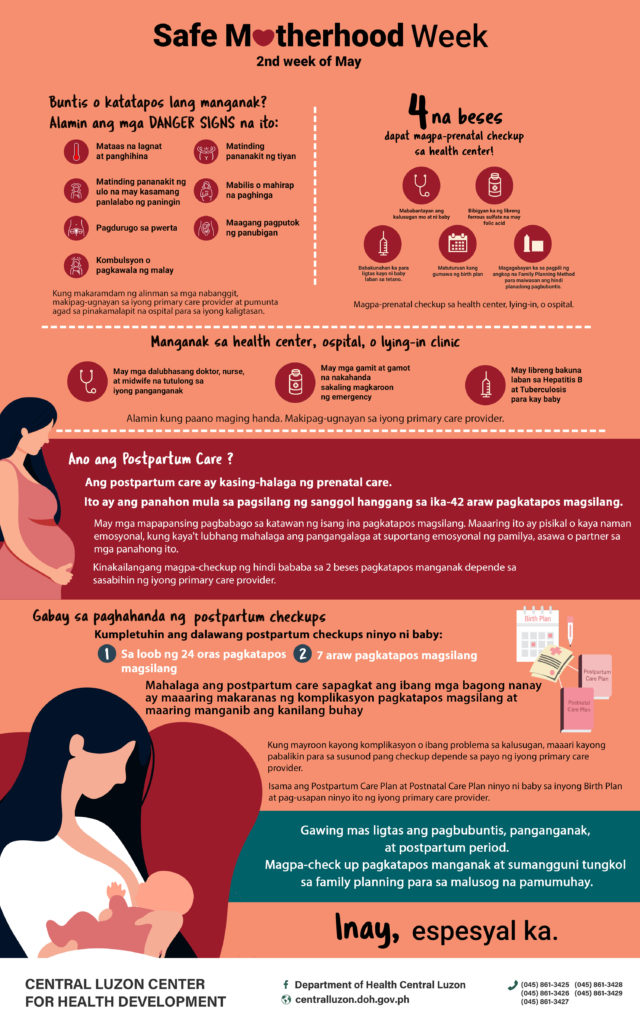THE DEPARTMENT of Health–Central Luzon Center for Health Development has raised greater awareness for maternal health care amid the threat of Covid-19.
The Safe Motherhood Program (SMP) aims to empower the women of Central Luzon to have full access to quality maternal health care services towards safe pregnancy and delivery of their child, as well as newborn health care services using innovative approaches including nutrition.
Usually, pregnant women take their initial pre-natal checkup during the second trimester or between the fourth to sixth month of their pregnancy. SMP emphasizes the importance of having at least four prenatal checkups: one each for the first and second trimester, and two for the third trimester. This is to detect any possible risk involved with pregnancy—most especially during the first trimester—and to avert possible complications that may arise during childbirth.
Due to the extreme physiological processes involvedlike cardiovascular, metabolic, and respiratory changes, pregnancy and childbirth have always placed mothers and babies at risk. The 2020 Maternal Death data in Central Luzon shows that maternal mortality rate is at 39.68%, neonatal mortality is at 2.24%, infant mortality at 5.88%, and perinatal mortality at 4.76%.
The goal of the SMP is to minimize maternal and neonatal morbidity and mortality. This will be achieved through the improvement of maternal and neonatal health by creating preventive and promotive activities including prenatal check-ups, anti-tetanus vaccines, free ferrous sulfate with folic acid, newborn screening, and family planning. Additionally, addressing of avoidable factors that can cause death during pregnancy, childbirth, and postpartum period is observed. This program, with the cooperation and efforts of the Local Government Units (LGUs), shall establish a cost-effective and sustainable approaches of providing easy access to quality maternal and newborn health services, especially to disadvantaged women,and enable them to give birth safely in health facilities near their homes.
Oftentimes, mothers assume they are safe from possible complications that may emerge after giving birth. It is essential for the mothers to have the ability to take care of themselves and to be healthy following delivery. Postpartum care from labor to 42 days after delivery is important as physical and emotional changes occur within this period. Mothers are highly encouraged to at least have two postpartum check-ups: (1) within 24 hours after giving birth and (2) seven days after delivery. Family and spousal support is also advised.
Along with the safe pregnancy measures, the DOH CLCHD encourages women to practice exclusive breastfeeding for the first six months after giving birth. Breastfeeding has been proven to significantly improve the health and survival of infants. Studies conducted by the World Health Organization revealed long-term benefits such as lower mean blood pressure and total cholesterol, and higher performance in intelligence tests among children. In addition, it has been proven to prevent obesity, overweight, and type 2 diabetes.
Relatively, an article published in 2019 by the Centers for Disease Control and Prevention mentioned that hormonal changes experienced during breastfeeding may delay the return of menstrual periods, hence reducing exposure to estrogen – hormones linked to an increased risk of breast and ovarian cancers.
The agency, in collaboration with the LGUs, shall continue to update its strategies to address critical reproductive health concerns. These also include the control of sexually transmitted infections and mother to child transmission of HIV. Through the continued efforts in monitoring the implementation of policies and evaluating of effectiveness in improving maternal outcomes, these may consequently translate to reduced maternal mortality by at least 21 percent.
Safe Motherhood Week is a great reminder not only for mothers to look after their infant but also for mothers to look after themselves! — Paul Matthew Lacson/DOH-3





